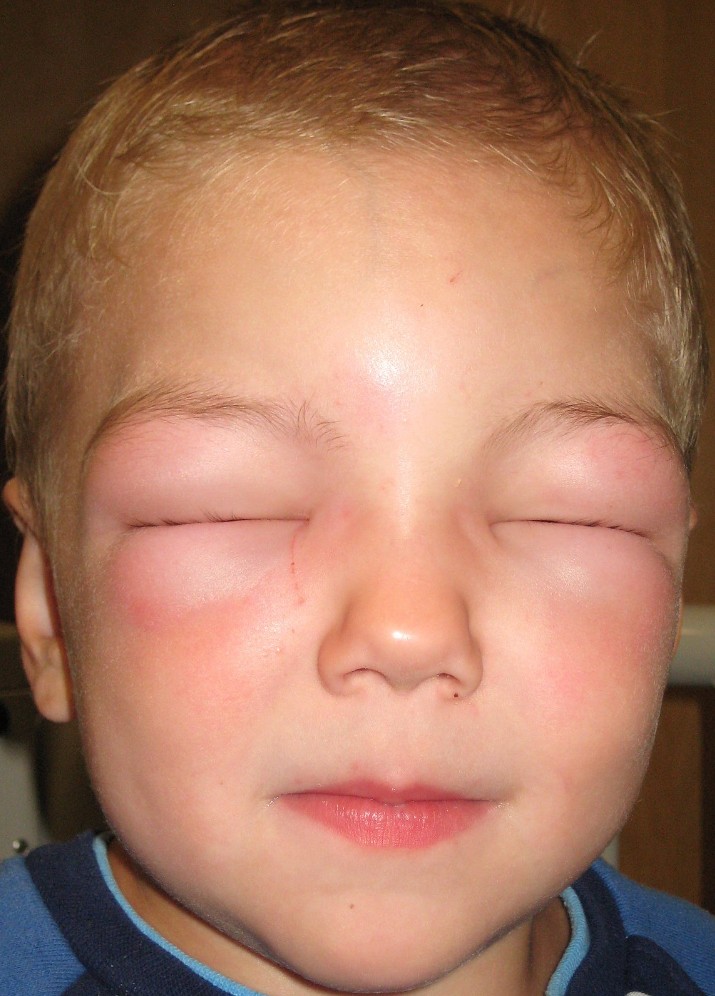XAI
 Angioedema is a medical condition characterized by the rapid swelling of the deeper layers of the skin, often affecting areas such as the face, lips, tongue, throat, and sometimes the extremities. It can also involve the mucous membranes and, in severe cases, the airway, leading to difficulty breathing, which can be life-threatening.
Angioedema is a medical condition characterized by the rapid swelling of the deeper layers of the skin, often affecting areas such as the face, lips, tongue, throat, and sometimes the extremities. It can also involve the mucous membranes and, in severe cases, the airway, leading to difficulty breathing, which can be life-threatening.
Causes of Angioedema:
- Allergic Reactions: Often triggered by allergens such as foods (e.g., nuts, shellfish), medications (e.g., penicillin, aspirin), insect stings, or latex.
- Hereditary Angioedema (HAE): A genetic condition caused by a deficiency or dysfunction of C1 esterase inhibitor, leading to recurrent episodes of swelling.
- Drug-Induced: Certain medications, particularly ACE inhibitors (used for hypertension), can cause angioedema.
- Idiopathic: In some cases, the cause of angioedema is unknown.
- Autoimmune Disorders: Conditions like lupus or other autoimmune diseases can sometimes trigger angioedema.
Symptoms:
- Swelling: Sudden and pronounced swelling, typically in the face, lips, eyes, or throat.
- Pain or Discomfort: The swollen areas may feel tight, painful, or uncomfortable.
- Difficulty Breathing: If the swelling affects the throat or airway, it can lead to breathing difficulties, which is a medical emergency.
- Abdominal Pain: In cases of hereditary angioedema, swelling can occur in the gastrointestinal tract, leading to severe abdominal pain.
Diagnosis:
- Clinical Evaluation: Based on the appearance of swelling and patient history.
- Blood Tests: To check for levels of C1 esterase inhibitor in suspected hereditary angioedema.
- Allergy Testing: To identify potential allergens if an allergic reaction is suspected.
Treatment:
- Antihistamines: Often used to reduce swelling in cases of allergic angioedema.
- Corticosteroids: May be prescribed to reduce inflammation and swelling.
- Epinephrine: In cases of severe allergic reactions (anaphylaxis), epinephrine is administered to quickly reduce swelling and open the airways.
- C1 Inhibitor Concentrates: For hereditary angioedema, C1 inhibitor concentrates or other specific medications like icatibant or ecallantide may be used.
- Avoidance of Triggers: Identifying and avoiding known triggers is crucial in preventing future episodes.
Emergency Management:
- Airway Management: In cases where the airway is compromised, immediate medical intervention is required, which may include intubation or a tracheotomy.
- Epinephrine: Immediate administration of epinephrine in cases of anaphylaxis.
Prognosis:
- Allergic Angioedema: Usually resolves with appropriate treatment, but recurrent episodes may occur if the trigger is not identified and avoided.
- Hereditary Angioedema: Lifelong condition that requires ongoing management, but with proper treatment, individuals can lead normal lives.
Notes:
- Patient Education: Patients with a history of angioedema, especially those with hereditary angioedema or a history of severe allergic reactions, should be educated on recognizing symptoms early and carrying emergency medications like epinephrine auto-injectors.
- Follow-Up: Regular follow-up with a healthcare provider is important for managing chronic or recurrent angioedema.